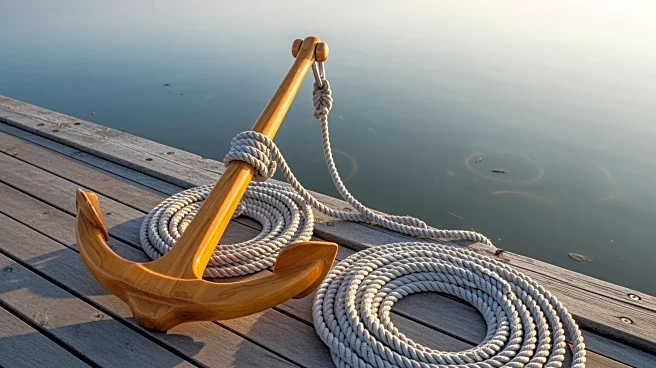What's Happening?
The UK government, along with other members of the North-East Atlantic Fisheries Commission (NEAFC), voted against a proposal by the European Union to set mackerel fishing quotas in line with scientific
advice. The EU's proposal aimed to reduce mackerel catches by 77% to ensure the sustainability of the fishery, which is currently in a state of collapse. Conservationists have condemned the decision, highlighting that mackerel quotas have historically been set higher than recommended, leading to a significant decline in the fish population. The UK Environment Department (Defra) defended its decision, stating that the total allowable catch should first be agreed upon in separate consultations before being finalized within NEAFC.
Why It's Important?
The decision to oppose sustainable fishing quotas has significant implications for the mackerel population and the broader fishing industry. Mackerel is a crucial fish stock in the North-East Atlantic, and its decline could have long-term ecological and economic consequences. The opposition to the EU's proposal suggests a prioritization of short-term economic gains over long-term sustainability, which could lead to overfishing and further depletion of the stock. This decision may affect the UK's reputation in international environmental and conservation circles, as it appears to disregard scientific advice in favor of immediate economic interests.
What's Next?
The UK and other NEAFC members may face increased pressure from conservation groups and the EU to reconsider their stance on mackerel quotas. There is potential for further negotiations at the Coastal States consultations to establish a sustainable management plan for mackerel. The UK government may need to balance economic interests with environmental responsibilities, potentially leading to policy adjustments in the future. Stakeholders in the fishing industry will likely monitor these developments closely, as changes in quotas could impact their operations and profitability.
Beyond the Headlines
The decision highlights broader ethical and environmental concerns regarding the management of natural resources. It raises questions about the role of scientific advice in policymaking and the potential consequences of ignoring such guidance. The situation underscores the need for international cooperation in managing shared resources and the challenges of aligning economic and ecological priorities. Long-term sustainability of fisheries is crucial not only for environmental health but also for the livelihoods of those dependent on the industry.









